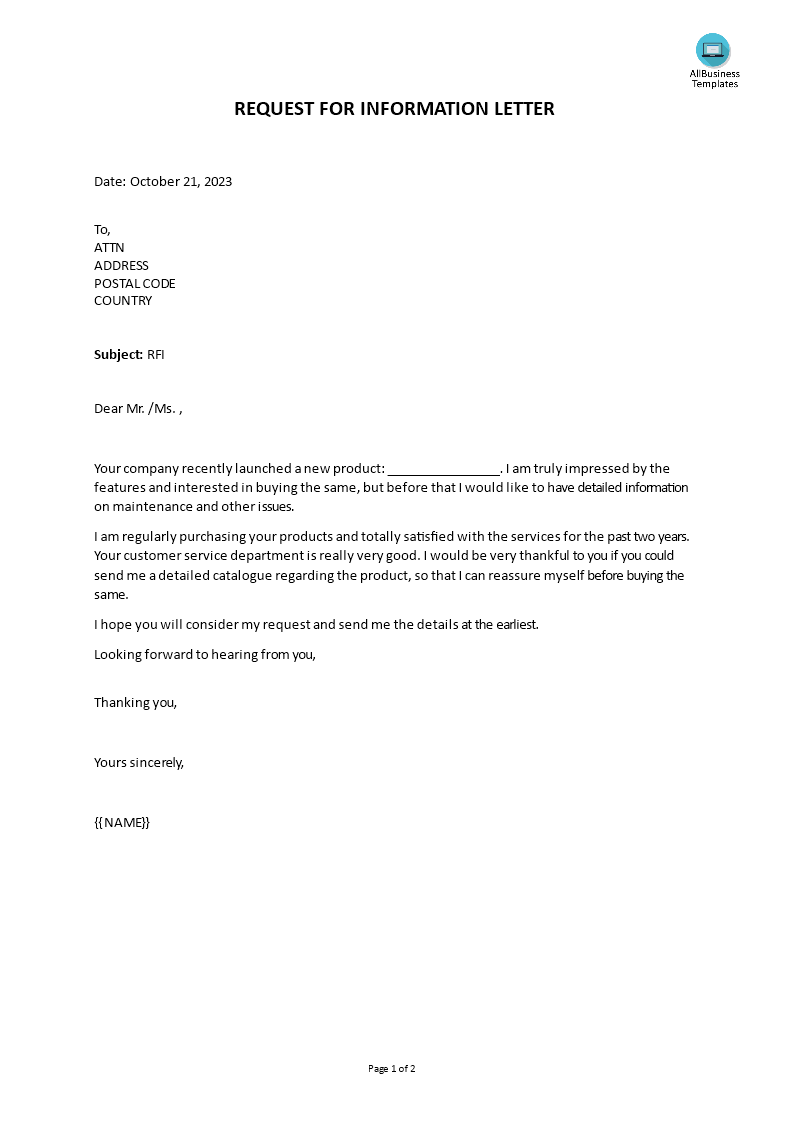Information Request Letter
Sponsored Link高级模板 保存,填空,打印,三步搞定!

下载 下载 Are you looking for a proper Information Request Letter? How does a letter requesting information work? What should I include in a letter of request for information? this Information Request Letter template now!
只有今天: USD 1.49
点击购买

可用的免费文件格式:
微软的词 (.docx)- 本文档已通过专业认证
- 100%可定制
- 这是一个数字下载 (24.24 kB)
- 语: English
- 付款完成后,您将收到包含该文件的电子邮件。
Sponsored Link
Are you looking for a proper Information Request Letter? How does a letter requesting information work? What should I include in a letter of request for information? Our information request letter template can help you quickly and easily craft a professional letter to ask for information. It can be downloaded and easy to use. Try it today!
An information request letter is a formal written document used to seek specific information or details from an individual, organization, or entity. These letters are typically used in various professional, business, or personal contexts to request information that is not readily available or known to the requester. Information request letters should be clear, concise, and polite, and they may be used for a wide range of purposes, including:
- Business Inquiries: Companies may send information request letters to other businesses or suppliers to gather details about products, services, pricing, or terms of a potential business partnership or transaction.
- Job Applications: Job seekers might use information request letters to inquire about job openings, job descriptions, application processes, or interview schedules from potential employers.
- Research and Surveys: Researchers and academic institutions often send information request letters to individuals or organizations to request data, interviews, or participation in surveys or studies.
- Legal Matters: Attorneys may use information request letters as part of the legal process to request specific information or documents from individuals or entities relevant to a legal case.
- Government Inquiries: Government agencies may send information request letters to individuals or businesses to gather information for tax audits, investigations, or compliance checks.
- Personal Matters: Individuals may use information request letters for personal reasons, such as requesting records, documentation, or clarification on various matters.
Here are the key components typically included in an information request letter:
- Sender's Contact Information: Include your name, address, phone number, and email address at the top of the letter.
- Date: Add the date on which you are writing the letter.
- Recipient's Contact Information: Include the recipient's name, title (if known), organization, address, and any relevant contact details.
- Salutation: Address the recipient with a formal salutation, such as "Dear Mr. Smith" or "To Whom It May Concern."
- Introduction: Start with a brief introduction, stating the purpose of your letter and why you are requesting the information.
- Specific Request: Clearly and concisely state the information you are requesting. Be specific about what you need, and if applicable, provide context to help the recipient understand the importance of the request.
- Reason for the Request: Explain why you need the information and how it will be used. This can help build trust and increase the likelihood of a positive response.
- Additional Details: Include any relevant details or instructions, such as preferred delivery methods, deadlines, or reference numbers.
- Closing: Thank the recipient for their assistance and express appreciation for their prompt attention to your request.
- Signature: Sign the letter in ink if it is a physical letter. If it's an email, you can include a formal closing (e.g., "Sincerely") followed by your typed name.
- Enclosures: If you are requesting specific documents or information, mention any enclosures you have included with the letter.
- Contact Information: Provide your contact information again, in case the recipient needs to reach you for clarification or additional details.
- Follow-Up: Express your willingness to follow up or provide further information if needed.
Information request letters should be polite and professional in tone, and they should clearly communicate the purpose of the request while respecting the recipient's time and privacy.
DISCLAIMER
Nothing on this site shall be considered legal advice and no attorney-client relationship is established.
发表评论。 如果您有任何问题或意见,请随时在下面发布
相关文件
Sponsored Link
